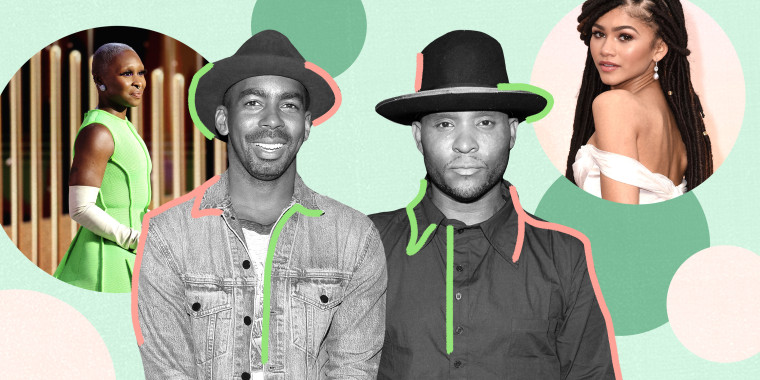Following Sunday's virtual Golden Globes ceremony, two acclaimed Black stylists had an in-depth conversation on Instagram Live about diversity and inclusivity on the red carpet.
Jason Bolden, who styled Cynthia Erivo and Storm Reid for the awards show, and Law Roach, who styled Tiffany Haddish and Anya Taylor-Joy, spoke for more than an hour about the feeble diversity efforts in Hollywood, the unspoken struggles of "making it" in the industry as a person of color and so, so much more.
They kicked off their conversation by discussing an article published in Women's Wear Daily that questioned why so few Black designers were represented at the Golden Globes. Both Law and Bolden said that the article, written by fashion journalist Booth Moore, implied that the burden of featuring designers of color was solely on Black actors and stylists.
"We called each other last night because we were just ... floating because we're so excited about the night and celebrating each other," said Bolden. "And then in the midst of that, we got bombarded with (Moore's) impression of how we need to perform as Blacks, and how she had decided to put the weight of the red carpet back on Black women."
Bolden pointed out that the article featured a photo of Cynthia Erivo, who wore a striking neon green look by Valentino, and said that it implied a misstep for not dressing her in a Black designer.
"What (the article) is implying is that the brunt of the fight on diversity and inclusion all should be on our backs, it's our responsibility, right?" said Bolden. "And what's unfair about that is we are still not the ones that hold the power, and we are not the gatekeepers. ... At what point are our white counterparts held responsible?"
"At what point are our white counterparts held responsible?"
Jason Bolden
Bolden said that in the end, he believed the responsibility is on those in power to "change" the way the red carpet looks.
"You own the space, you empower the space," Bolden said. "The only people who can change the spaces are the people who own it and empower it. That is it. I can't do it."
Bolden also said that white stars are frequently praised for working with Black designers and stylists, while that attention doesn't go the other way.
"None of our allies are dealing with that," Bolden said. "They get to show up dressed in Black talent and say 'I did it, I'm here for the cause,' and they get to go back to their fantastic life, and get all the checks and all the jobs and are never questioned. But yet here we are, being questioned again."
On Instagram, Moore issued an apology for the article, writing that she had hoped to "bring up what (she) thought was a legitimate issue." Women's Wear Daily also issued an apology on their Instagram account.
"I did not mean to imply that it is only the responsibility of a Black stylist or a Black talent to support Black designers," she wrote. "It's the entire industry's responsibility to support diversity and inclusion."
Roach said that it's important to him that celebrities seek him out because they like his work, not just because they're looking to hire a Black stylist.
"For me to work with Anya (Taylor-Joy) was a joy," Roach said. "Anya called her publicist and said, 'Can you find out if Law will work with me? Because I love his work.' She didn't make that call because she was thinking, 'Oh, I want to be cool and work with a Black man.' She really, really, really just enjoyed my work. ... She was like 'I've been watching what you've done in your career, I really want to work with you, will you work with me?' And I was like, 'Absolutely.' ... That is the talent reaching out."
Roach said that it's important that publicists and other team members involved in an actor's appearance try Black stylists, noting that only a few publicists will "give (Black stylists) a chance" and think of them on a regular basis instead of just when they're looking for diversity.
"It goes back to this idea (that) we can't accomplish chic. We cannot accomplish smart, we cannot accomplish effortless," said Bolden, recalling an instance when a white publicist representing a Black actor visited his studio. "She basically looked around my studio and said, I don't think she realized she said it out loud, but she was, like, 'It's so clean in here.' And she started going through the racks, and she was, like, 'I have someone that I would love to introduce you to, but I think you only' — her exact words — 'I think you only know how to dress Black women.'"
"This is what we live in," Bolden continued. "... Every time we get a chance to do something, they only want to call us, they literally only want to call us about Black Lives Matter (or) diversity and inclusion. ... There's never times where people reach out to us and really just want to talk about the work, the art."
Bolden said that the result of such disconnect can feel like "styling in two different worlds," which Roach agreed only makes their work harder.
"I feel like ... I have to work 10 times harder," Roach said. "I have to be 10 times more savvy, creative. I have to. I have to. I can't make a mistake, right? ... It's the feeling, it's the emotion that we have to do it, I have to do it, 10 times better."
